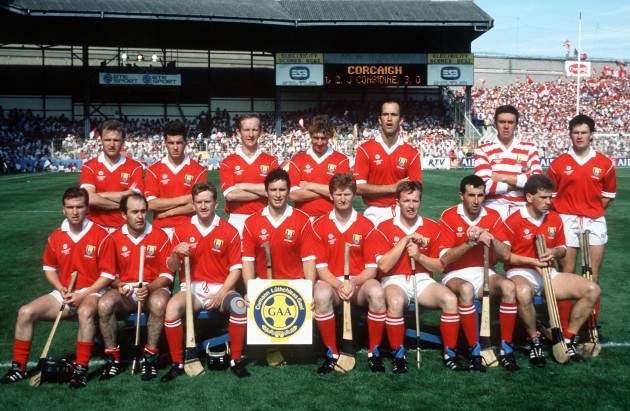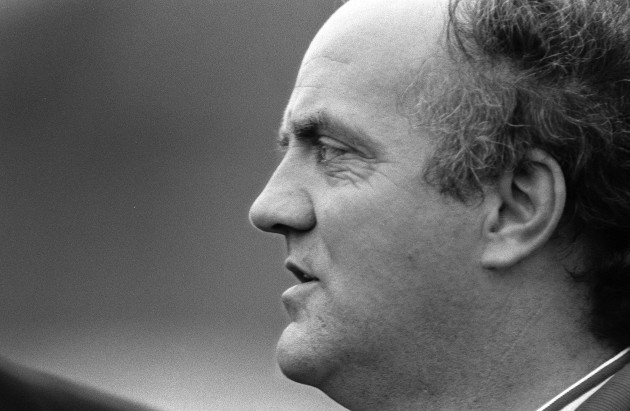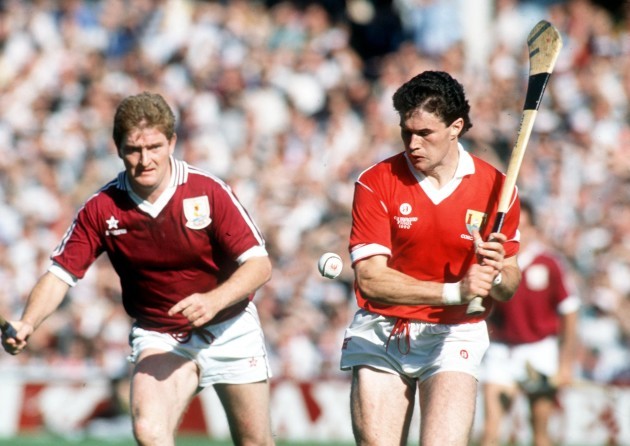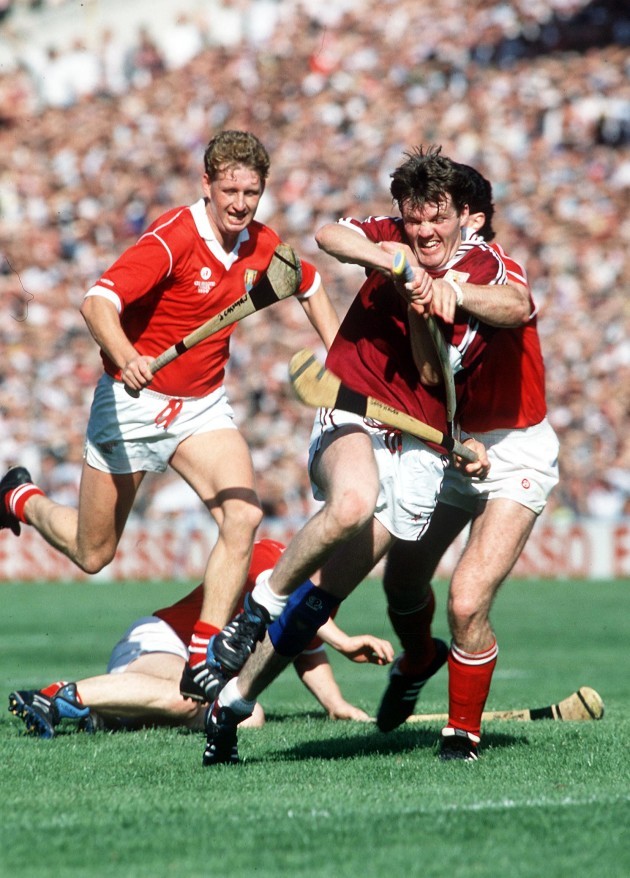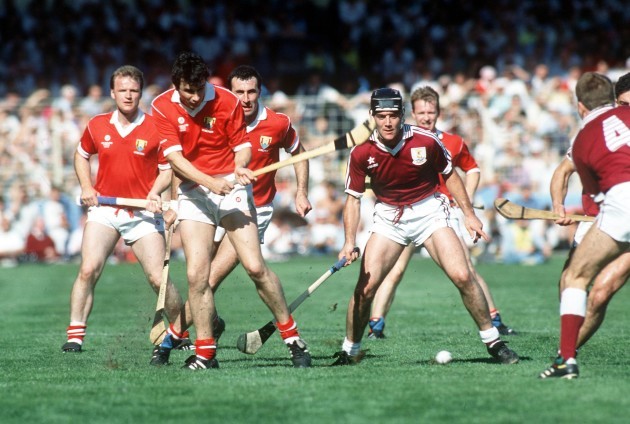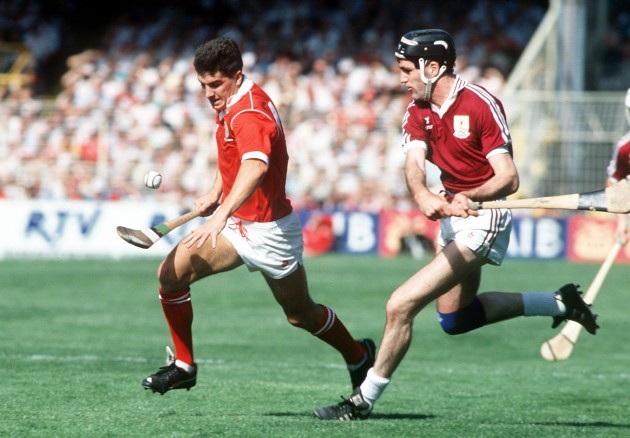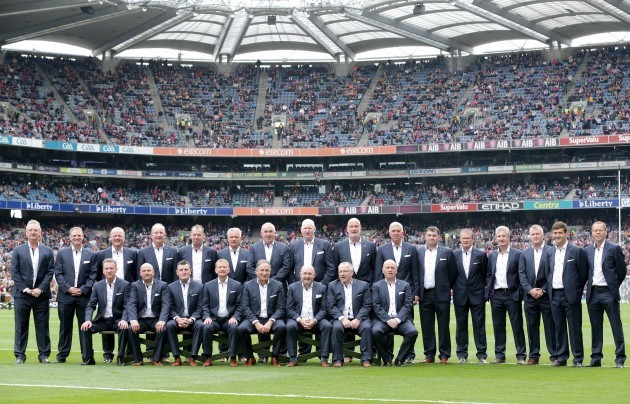THE CORK HURLERS’ dressingroom needed leadership at 4.10 p.m. on 3 September 1990.
Fr Michael O’Brien closed the door after himself and locked it, and then he and his staff got to work on rescuing the All-Ireland, from five points down to a rampant Galway.
“Something I’ll always remember is the dressing room at half-time,” recalls Tomás Mulcahy, “it was an incredible place to be. Just incredible.”
Mark Foley, John Fitzgibbon and Jim Cashman were amongst the players instructed to get into the shower area in the Croke Park dressing room, where a frantic Fr O’Brien then lashed a cold bucket of water over his players. “We weren”t sweating enough in the first half,” Foley says of O”Brien’s logic, “so we were suitably drowned with a container of cold water. It was his way of saying, ‘Well, wake up or you’re gone.’ And it probably worked.”
The priest shouted at the group of players shuffling around on the tiled floor to wake up. It was old school stuff.
“And,” says Cashman with a smile, “he gave another fella a belt.”
“If it happened now there’d be outcry, but it happened,” admits Tomas Mulcahy.
Cashman changed his jersey and walked into the toilet area, where Mulcahy and Dr Con, who’d been through it all even at that stage, were trying to formulate a plan of action. The young Blackrock centre back was punch-drunk from chasing the Tasmanian Devil of Joe Cooney around Jones’ Road for the 35 minutes:
“What am I going to do?” he asked, bamboozled. “Jesus Christ, he”s on fire.”
Dr Con’s bedside manner was typically sensitive: “‘He’ll never keep it up.’ That’s the best I could offer him,” says the medic.
The selectors convened in the shower area for a conferring of generals and the players took over outside around the table topped with gear and hurleys. “I remember Tomás [Mulcahy] went around to every player that day at half-time saying we can win this match,” says Dr Con. The players knew what was on the line and that the chance of a lifetime – possibly – was slipping from their grasp.
“It was never chaotic with Cork,” insists the laid-back Kevin Hennessy, “it was always cool. There wasn’t anyone shouting or screeching.”
“There was a bit of chaos alright,” contradicts Mulcahy. A 25-year-old John Considine, halfway through the biggest game he’d ever play, sat in the corner taking it all in, with the strange serenity of an airline passenger as the oxygen masks drop and the air hostess instructs. “I remember thinking, ‘This is Mul and the lads now,’” the Sars man says of the older players taking a grip on the room, “and I remembered back to the league game against Galway. And years afterwards I remember thinking should I have been more focused on the game; I was watching what was going on [in the dressing room]. I thought this was all amazing. I was watching what was happening.”
Frank Cogan, who’d won an All-Ireland in 1973 with the footballers, and the much respected masseur ‘Kid’ Cronin had been watching Cork’s hopes smoulder from the relative safety of beyond the endline. Cogan, who’d taken over the footballers that summer while his brother-in-law Billy Morgan served a county-board-sanctioned sideline ban, told Considine, “That wind is way stronger than I thought it was.”
On a sunny day which defied a gloomy forecast, the wind was to have a say in which flags fluttered over Croke Park at day’s end. “It’s a strange thing, but you believe it’s destiny,” says Considine of his mindset as he looked around the room, “you just believe this is going to happen. I know it’s strange, but you just think, I don’t know, there’s something … there was just a good vibe. There was just a good vibe.”
As the Sars defender was sitting there, watching Tomás Mulcahy and his lieutenant Tony O’Sullivan slap players on the back and remind them where they came from and that the game was still here, Fr O’Brien rushed out of the showers area. “The Canon said something like “Jesus Christ, there”s only two of ye playing out there,” and the thing went on and on,” recalls Gerald McCarthy. “But when they were going out the door then, Hennessy got to the door and he turned around and says, ‘By the way, Father, who was the other player?’ And we all broke down laughing. It was needed, it was.”
“They got a bashing at half-time,” continues McCarthy, “but that’s why characters like that are needed. Nobody else would have said it.”
Forward Mark Foley knew he had a finite amount of time to keep his afternoon going once the ball was thrown in again. The country singer Louise Morrissey entertained the crowd at the break. As she sang ‘The Banks’ for the Cork supporters, one of their number said, “I’d nearly be better off down the Mardyke the way things are going.”
In the Galway dressing room, Cyril Farrell wished his side had made more hay in the first half. “We felt we should be more up, but we didn’t say that. We just said, ‘Lads, keep hurling and take the scores. Go for it,’” says Farrell. “‘Just go for one or two more, tap over one to go to six or seven to put pressure on Cork.’”
Meanwhile, the Cork selectors decided to stick. Jim Cashman was too good a hurler to twist on, according to Gerald McCarthy: “We left him there. We left him stew on it a bit and gave him a chance to work his way out of it. And he did. He performed well in the second half.”
“Jim Cashman was in big trouble,” continues McCarthy. “We knew it and Jim knew it. There was a right talking-to by the Canon at half-time. Jim was a classical player – great clearance of the ball, he wouldn”t be blocked or anything if he got the ball, it was gone. He was a great centre back. A great centre back.”
O’Brien barked out instructions to his troops around him. His orders were met with the usual nods a coach gets from players, until he told his misfiring forward line to ‘keep it open’ and use the width of the Croke Park field, a motif that often ordained his technical directions. “Well I suppose the fellas in the corner paid their money as well,” said John Fitzgibbon.
Fitzgibbon, who wasn’t slow in chatting back to the authority figure in the priest’s garb, insisted again there was no ball coming in to him. “I felt anyway, and the Canon felt, look we can get goals. If we play the ball right and if we tighten up at the back, we can get goals,” says McCarthy. Ger Cunningham led the discussion on the puck-outs; he knew, with the wind, the imperative was to launch ball beyond the likes of Keady.
O’Brien gathered his players around in a circle, knitting themselves together. Like a Shakespearean actor in the round at the Globe, he knelt in the middle of the circle clutching a Cork jersey. Balling it into his fist, he wept theatrically and implored his players to get the job done. “People might laugh at this and say it never happened, but the Canon was seriously emotional,” recalls Mulcahy of the Canon’s soliloquy.
“But the last couple of minutes before we went out after half-time were just phenomenal. Because he was down on his hands and knees, he had a red jersey in his hand, there was tears coming down. “We were thinking, this is incredible. There was tears coming down, we’re all around him, wrapped around each other and he’s in the middle. “Do it for yerselves, do it for yere families and do it for me.”
“That was it. ‘Out ye go.’”
If Fr O’Brien’s words were the antidote to a painful first half, it took some time to work its way through the system. Having been five points ahead at the break, Galway stretched that out to seven and Cork looked in real trouble.
But the signs were good.
Goals were the vocabulary in which the Cork forward line communicated, and although early in the half Ger Fitzgerald and John Fitzgibbon stuttered over handy chances, the Galway full-back line was listing. Dr Con’s watery half-time reassurance that Joe Cooney would ‘never keep it up’ proved accurate as his huge influence dulled.
“He started to drift out in the second half, I think to pick up a few balls,” Jim Cashman recalls. “And they came to me instead of him. I was saying thanks be to God.”
The balls that fell into Cooney’s lap from the heavens in the first half were no longer arriving. Tomás Mulcahy had moved on to Keady and the experienced skipper curbed the Galway talisman’s influence on the game quickly, while Mark Foley looked more at home once switched to the wing, chipping in with crucial scores.
“I remember at one stage I was watching, God rest him, Tony Keady’s highlights recently and he caught the ball and he was gone about three or four yards away from me before I realised I was coming in from the wrong side,” says Mark Foley modestly. “Literally. He had caught it and he was gone down the field. The lads were joking that he beat me down the field and he also beat me back into position. That was his third or fourth big final and he was a serious player.
“Now, in hindsight, Mul knew how to play him and he played him well. When Tomás went in on him it opened up the breaking ball and obviously it was a great help as well that Ger’s puck-outs were landing probably beyond the half-back line in the second half and we had fierce momentum from that.”
Nine minutes into the half, Mulcahy notched a captain’s goal. The Canon turned to Gerald McCarthy and said, “We”re going to win.”
Cunningham was able to slingshot his puck-outs deep into the Galway half, giving the ever-dangerous Cork forwards plenty to play with. “What we did in the second half, we pulled the half-forward line a little deeper towards the midfield so we tried to get [the forwards] turning,” the goalkeeper explains.
Cork hoped Galway’s famous half-back line would push up with their men rather than sit back, and Cunningham could drop the ball in behind them. The plan worked, meaning there was space for Cunningham to aim at and for the Cork forwards to run into. “We were on the front foot then,” recalls the Rebels’ netminder.
Cyril Farrell was helpless on the line as he watched the scuds drop in behind the likes of Keady. “In the name of God, it was hard to get out,” he recalls. “So the supply was well cut off. And the big thing was, when they got the chance of goals in the second half they took them.”
Minutes after Mulcahy’s goal, Galway should have had one of their own. Instead they came away wondering were the gods conspiring against them. Noel Lane batted the ball down for Martin Naughton, who was at full pelt. With just Ger Cunningham to beat, he lashed the ball off the 29-year-old goalkeeper’s face. When Naughton hared through, Cunningham had to make an instant decision: stay on his line or go?
Who knows how much data a human brain can process in those instances, but the long hours of practice the famously dedicated goalkeeper had clocked up had baked goalkeeping instincts into his brain. The Cork football boss sitting in the Hogan Stand would have been confident of his former student at least reacting correctly in what seemed like a scenario weighted towards the attacker.
“I can still see him coming in,” Cunningham says. “It all goes back to a bit of football training with Billy [Morgan] and a bit of hurling training and I played a bit of soccer as well. It’s all about cutting down the angles. Instead of waiting on my line, I said I’d come off to try to narrow the angle and most players would go across you. They’d try to hit the ball across you rather than hit the inside, which is the harder shot.
“In those situations in a one-to-one you half-gamble. You half-try to read the situation. So I read it that he was going to go across me and it just went off my head – hit off my forehead – and it went out for a sixty-five, which wasn’t given. One of the small things, you get a break.”
RTÉ had John Giles in co-commentary for their cross-channel soccer coverage by the late 1980s but had yet to put experts beside Ger Canning for hurling and football games. For the 1990 hurling final, however, UTV had employed Tipperary boss Babs Keating to give his views as a co-commentator alongside Adrian Logan. He didn’t hold back.
“I must make a comment about John Moore,” he said of the referee. “Around our country, it’s been said that Cork have never lost with him.” When Naughton’s shot was put behind via Cunningham, he added, “These guys have been training all year and for officials to make those decisions is just not acceptable.”
The mystery has always seemed like a cold case that’s never been closed. The Barrs goalkeeper is on one knee holding his bloody face and is surrounded by Cork players and staff in the wake of the collision. Yet the umpire waved the ball wide and Galway were robbed of a near-certain point.
“It changed the match,” says Ger Fitzgerald. Cork don’t need much persuasion to be convinced it is their day. “They’re the small things,” agrees Cyril Farrell.
“Cunningham made a great save; if that ball went into the net I think we would have had a great chance of winning. Naughton went through, Ger came down to kind of smother it, to cut down the angle – he was a great goalie – it hit off his head and the umpire waved it wide. But sure, okay, the umpire was kind of watching the bullet coming, but the referee should have seen it as well. Everyone saw it except the officials.”
Cunningham met the umpire years later and made enquiries, now comfortable that the statute of limitations applied to the robbery. The umpire explained that he’d stepped back, perhaps expecting to be picking up his green flag, in the split second that the collision occurred and that his view was obscured by the stanchion.
“And all he saw was the shot and all of a sudden the ball was at his feet. He assumed he put it wide so he put up the two hands for a wide,” says Cunningham. On little moments, titles are won.
“The ball went down the field and I think it was Tony O’Sullivan latched on to it and over the bar,” says Farrell. “When those little things start going against you, you know, you can look out.”
After that turning point, Cork would raise four green flags in the space of a few minutes and leave Galway stunned on their stool. Mark Foley lifted over a monster point from the sideline and three minutes later Kevin Hennessy would play him in for an All-Ireland final goal on his sixth championship game.
Dr Con was on his rounds during the second half when he called out to Fitzgibbon from behind the goal, reminding him of his car-park pledge to celebrate like Ring. “What was all that bullshit?” the medic roared from behind John Commins’ goal.
“You haven’t pucked a ball.”
The maverick in the corner may have raised an eyebrow at the rebuke, but his subsequent actions spoke volumes. Mark Foley sent the ball his way almost immediately and Fitzgibbon swept it home clinically. Fitzgibbon wheeled away and threw his arms in the air in homage to Ring, just like he’d promised Dr Con.
“We might not as players have taken much notice on the day, but when you look back on it now, this was inside in John Fitzgibbon’s head,” says Mulcahy of the celebration.
Fitzgibbon and Kevin Hennessy might have been an unlikely duo; a cool city slicker and a wisecracking culchie from different hurling generations. But the odd couple dovetailed when it came to raising Fr O’Brien’s blood pressure with backchat … and combining to score goals.
Like kids in a tree house, the pair even had secret passwords they employed on the field. “You’d hear the sign and you’d throw yourself but then leave it run on,” explains Hennessy of the pickpockets’ street routine.
“And I remember the ball came across and I was up against Sean Treacy, the full back with Galway, Fitzy was after giving me the ball and I threw myself across and threw in the hurley and pretended to play it.
“It bounced back to John and he netted it straight off. Took a bounce and left it go. By accident now, Sean Treacy got opened in that move – a cut on the forehead. But as it went on I remember getting a ball from Tomás Mul and coming in from the old Hogan Stand side and it opened up for me and Fitzy was running away and half-turning around. I threw it out in front of him and he just whipped on it.” Another Cork goal.
As the Cork bench and supporters celebrated, Cyril Farrell might well have complained about the amount of steps Fitzgibbon took on his way to scoring his second of the day. It was one of a clutch of oversights from referee John Moore that would have lit the way home into the night for Galway supporters.
“Sure look it, he was that kind of player; the ref was probably looking at him in flow rather than in steps,” is Farrell’s phlegmatic view on a game that’s more poetic than mathematical.
Galway took one of theirs too. Brendan Lynskey was introduced for Anthony Cunningham – “the quickest player I ever faced,” according to Kieran McGuckin – and Lynskey found the net. With the difference back to three points, a comeback was hinted at. Typically, Tony O’Sullivan sent over an insurance point to give Cork a four-point lead and Cyril Farrell extended his hand to congratulate his opposite number.
“No way, Cyril,” said O’Brien, “Galway are never beaten until the final whistle.”
Joe Cooney scored the final point of the game, but it wasn’t enough for Galway.
Losing an instant classic doesn”t shorten the winter any more.
This is an edited extract from The Double: How Cork Made GAA History by Adrian Russell, editor of The42.
